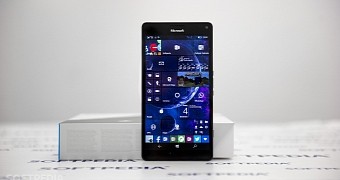Back in late 2016 when Microsoft teamed up with Qualcomm to announce Windows 10 on ARM, everyone thought it was the beginning of the Windows Phone overhaul, especially because this project was believed to be the first step towards bringing the full version of Windows 10 on smartphones.
And yet, even though Microsoft did present Windows 10 on ARM on an HP Elite X3, which is already up for grabs, Joe Belfiore now says that the plan is not to bring the full version of the operating system on the existing smartphones.
And while that might give hope that at some point new smartphones could be able to run full Windows 10, that doesn’t seem the case, with Belfiore explaining in a broadcast that the plan is to actually allow ARM devices to do that, which in turn enables customers to benefit from longer battery life.
Windows 10 Mobile will remain the focus for phones, Belfiore says, though this is clearly something that it’s hard to believe right now given that Microsoft itself hasn’t released a single new feature for this operating system since it started work on the Redstone 3 update.
Only aimed at PCs
Here’s the full explanation that Joe Belfiore offered to the more tech-savvy users when detailing why full Windows 10 won’t arrive on smartphones:
“The Windows 10 on ARM effort is about enabling the PC experience on devices that are built on ARM so that they're connected all the time and have great battery life. So the experience is a desktop PC experience, it's not a phone-like experience. For phone-like experiences on ARM, we have Windows 10 Mobile. What Windows 10 on ARM is, is a desktop-like experience so that you get the battery life that ARM processors tend to have.
The other thing that's interesting about this is that in all cases where you build ARM software, it's not so easy to just put it on another device. The OS intermingles with what's called the BSP (board support package), and that's how the software talks to the SoC.
There's special work that has to be done to get the OS talking to the BSP, talking to the SoC, so it's not like the PC ecosystem where we write an OS in the same binaries that run on lots of different PCs. With ARM devices with SoC, you have to more closely target it. So that is often the case why it's more challenging for us to get updates to a wide range of ARM devices. They're all quite different, which adds delay, and as the number of people using those devices gets smaller, it unfortunately makes less sense for us to invest more time and energy in that.”
On the other hand, rumor has it that Microsoft is actually working on a new smartphone powered by CShell, the new project that would bring the same shell on both smartphones and PCs. This means that Microsoft is indeed committed to keeping Windows 10 Mobile alive, and this new device could help reignite interest in the platform.
If it gets the green light, the new smartphone could see daylight sometime in 2018, though it’s worth mentioning that the secrecy around the project allows Microsoft to cancel it overnight at any given moment.

 14 DAY TRIAL //
14 DAY TRIAL //